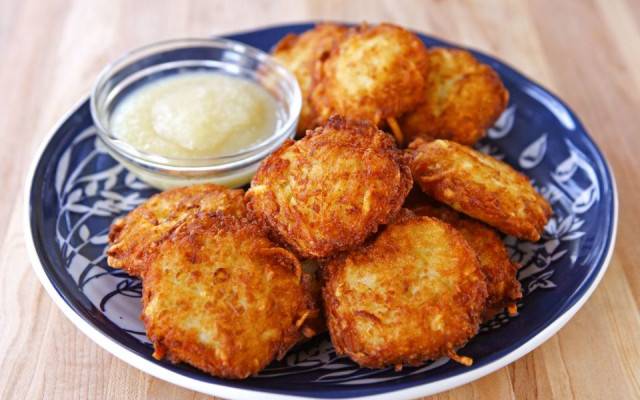Can it be that eating potato latkes is a Divine commandment? What about the oil-drenched, jelly-filled donuts?
By Rabbi Ari Enkin
Rabbinic director, United with Israel
An always-welcome requirement on most Jewish holidays is the mitzvah (commandment) to eat or otherwise be surrounded by food.
That’s right – as we can quickly recall, most holidays boast a precept requiring us to partake in elaborate eating marathons in order to observe the holiday properly. Indeed, one need look no further than Shabbat, with its requirement to eat at least three meals over the course of the day!
Jewish law discusses these eating requirements quite seriously and in much detail, such as how many courses the meals must include, what they must consist of, the status of meat, fish and poultry, and other gastronomical issues. The Passover seder, Rosh Hashana eve, the Purim meal, and the list goes on and on…
Chanukah, however, remains shrouded in mystery and uncertainty in this area. Is there an actual requirement to feast over this holiday? Is Chanukah similar to its cousin, Purim, in which there is indeed a requirement to feast?
Can it be that eating potato latkes is a Divine commandment? What about the oil-drenched, jelly-filled sufganiyot (donuts)?
Although it is common to hold elaborate meals on Chanukah and to snack on the famous Chanukah icons, it appears that according to Jewish law, such gastronomic experiences are merely optional. They are neither required nor necessarily recommended.
Nevertheless, some authorities insist that there is indeed a mitzvah component to eating elaborate meals in honor of Chanukah. This opinion takes into consideration that Chanukah also commemorates the rededication of the altar in the Holy Temple in Jerusalem, an event worthy of a celebratory meal in its own right. According to these authorities, gathering together for a meal complete with song and praise is certainly commendable.
Spiritual vs. Physical Victory
Ultimately, however, while feasting on Chanukah may be meritorious, it simply cannot be placed in the formal realm of mitzvot.
It is explained that on Purim, the “cousin” holiday of Chanukah, there is a mitzvah to feast, because Purim commemorates the physical and national annihilation that the evil Haman had plotted against the Jewish people. Hence, physical pleasures are appropriate and even required on Purim.
The Syrian-Greeks, however, had no interest in physically annihilating the Jews; their goal was to force them to leave their faith and assimilate completely into the Greek culture. Chanukah, therefore, commemorates a spiritual victory, not a physical one. Hence, all rituals and mitzvot of Chanukah focus on spirituality, not on physical or material (or gastronomic!) matters.
Perhaps we can conclude this discussion with the final words of the Shulchan Aruch, the Code of Jewish Law, which states: “A festive disposition is always a good thing!” Enjoy your donuts and latkes!

Bring Joy to Israeli Soldiers - Send Winter Care Packages!
We are honored to thank the young men and women of the IDF who risk their lives every day to defend the citizens of Israel.
Join us in sending winter care packages and personal notes of support to Israeli soldiers who are out in the cold all day.
Warm up a soldier's heart with essential winter wear including fleece jackets, hats, gloves and more. Keep an entire unit warm!
THE SOLDIERS REALLY APPRECIATE YOUR LOVE AND CONCERN!
Click Here to Send Your Gift and Personal Note to Israeli Soldiers

